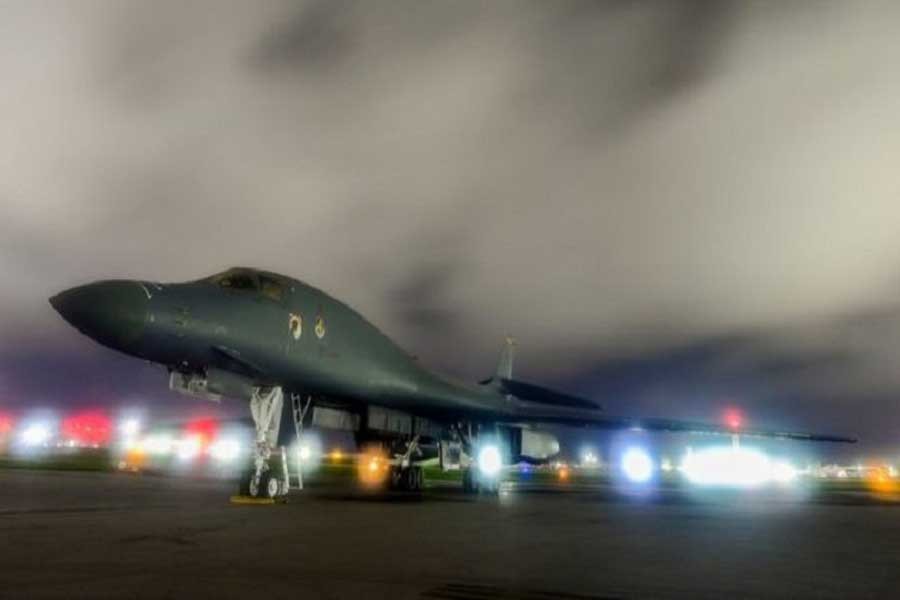North Korea has said it is considering carrying out missile strikes on the US Pacific territory of Guam.
The report in state media, quoting an earlier military statement, came hours after President Donald Trump threatened North Korea with "fire and fury".
The North's official news agency said it was considering a plan to fire medium-to-long-range rockets at Guam, where US strategic bombers are based.
The exchanges marks a sharp rise in rhetoric between the two countries.
The UN recently approved further economic sanctions on North Korea, which Pyongyang said were a "violent violation of our sovereignty", warning the US would "pay a price".
'MET WITH FIRE AND FURY'
On Wednesday, the official KCNA news agency said North Korea was "carefully examining the operational plan for making an enveloping fire at the areas around Guam" using its domestically made medium-to-long-range Hwasong-12 missiles.
The statement reported a military statement issued on Tuesday, which probably came in response to US military drills in Guam.
But it is the latest stage in a heating up of rhetoric between the US and North Korea.
Pyongyang, which has tested nuclear devices five times, tested two intercontinental ballistic missiles (ICBM) in July, claiming it now had the ability to hit the mainland US.
On Tuesday, media reports in the US claimed the North had achieved its goal of making a nuclear warhead small enough to fit inside its missiles.
While not confirmed, this was seen as one of the last obstacles to North Korea being a fully nuclear armed state.
A report in the Washington Post, citing US intelligence officials, suggested North Korea is developing nuclear weapons capable of hitting the US at a much faster rate than expected.
A Japanese government defence white paper also said the weapons programme had "advanced considerably" and that North Korea possibly now had nuclear weapons.
In response, President Trump warned North Korea to stop threatening the US, saying they would be "met with fire and fury like the world has never seen".
However veteran US Senator John McCain was sceptical about Mr Trump's statement, saying he was "not sure that President Trump is ready to act".
ANALYSIS: WORDS WITH CONSEQUENCES?
ANTHONY ZURCHER, BBC NEWS, WASHINGTON:
Donald Trump said that North Korean leader Kim Jong-un "has been very threatful, beyond a normal statement". So he responded with language that goes well beyond a normal statement for any US president.
Perhaps Mr Trump believes that no hyperbolic threats should go unmatched or that apocalyptic warnings are the only ones the North Korean leadership will understand. Perhaps he - intentionally or not - is pursuing a Nixonian "madman" style foreign policy, where adversaries will tread lightly to avoid triggering the wrath of an unpredictable US commander-in-chief.
When the leader of the world's greatest superpower, the only nation ever to have used nuclear weapons on an enemy, talks of unprecedented "fire and fury", however, those words have consequences.
During his presidential campaign Mr Trump criticised his predecessor Barack Obama for not enforcing a red line against Syria's use of chemical weapons. Now President Trump has drawn a fiery bright line of his own with North Korea - one that could commit the US to a perilous course of action if his words go unheeded.
North Korea had reacted angrily after the fresh sanctions were announced on Saturday by the UN, in an attempt to pressure it into giving up its nuclear ambitions.
The sanctions aim to reduce North Korea's export revenues by a third.
KCNA said North Korea would retaliate and make "the US pay a price" for drafting the new measures.
It called the sanctions a "violent violation of our sovereignty", the news agency said.
China, which is Pyongyang's closest ally, has said it is "100 per cent" committed to enforcing the latest round of sanctions.
Russia and China have previously differed with others on how to handle Pyongyang, but in recent months have joined calls for North Korea to stop its missile tests - while also urging the US and South Korea to halt military drills, and withdraw an anti-missile system from the South.
THE TINY BUT IMPORTANT ISLAND OF GUAM
# The 541 sq km (209 sq miles) volcanic and coral island in the Pacific between the Philippines and Hawaii.
# It is an "unorganised, unincorporated" US territory, with a population of about 163,000.
# US military bases cover about a quarter of the island. About 6,000 personnel are based there and there are plans to move in thousands more.
# It is a vital staging post for US operations, giving access to potential flashpoints like the South China Sea, the Koreas and the Taiwan Straits.


